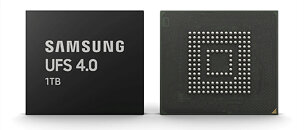Raevenlord
News Editor
- Joined
- Aug 12, 2016
- Messages
- 3,755 (1.18/day)
- Location
- Portugal
| System Name | The Ryzening |
|---|---|
| Processor | AMD Ryzen 9 5900X |
| Motherboard | MSI X570 MAG TOMAHAWK |
| Cooling | Lian Li Galahad 360mm AIO |
| Memory | 32 GB G.Skill Trident Z F4-3733 (4x 8 GB) |
| Video Card(s) | Gigabyte RTX 3070 Ti |
| Storage | Boot: Transcend MTE220S 2TB, Kintson A2000 1TB, Seagate Firewolf Pro 14 TB |
| Display(s) | Acer Nitro VG270UP (1440p 144 Hz IPS) |
| Case | Lian Li O11DX Dynamic White |
| Audio Device(s) | iFi Audio Zen DAC |
| Power Supply | Seasonic Focus+ 750 W |
| Mouse | Cooler Master Masterkeys Lite L |
| Keyboard | Cooler Master Masterkeys Lite L |
| Software | Windows 10 x64 |
Samsung has announced the implementation of the latest JEDEC standard specification with the adoption of UFS (Universal Flash Storage) standard 4.0. The new standard offers a number of improvements over the previous UFS 3.1 specification related to either performance or power savings. The new standard increases speeds of up to 23.2 Gbps per lane, double that of the previous UFS 3.1 standard. Additionally, UFS 4.0 unlocks sequential read speeds as high as 6.0 MB/s per mA - a 46% improvement over the previous spec, promising decreased battery drain even as workload time is reduced.
Samsung's UFS 4.0 implementation will leverage the company's 7th Gen V-NAND alongside a proprietary controller, which should ultimately enable speeds of up to 4,200 MB/s. Sequential write speeds are nothing to scoff at either, promising up to 2,800 MB/s. The improved performance doesn't translate to increased package sizes, however, as UFS 4.0 will be distributed in compact packages with a maximum dimension of 11 mm x 13 mm x 1 mm for more effective space utilization and design convenience - with capacities reaching the 1 TB per package. Mass production is expected in 3Q2022. Samsung expects its new UFS 4.0-based products to deliver new experiences with increased data throughput of 5G smartphones, future automotive applications, and even AR and VR.

View at TechPowerUp Main Site | Source
Samsung's UFS 4.0 implementation will leverage the company's 7th Gen V-NAND alongside a proprietary controller, which should ultimately enable speeds of up to 4,200 MB/s. Sequential write speeds are nothing to scoff at either, promising up to 2,800 MB/s. The improved performance doesn't translate to increased package sizes, however, as UFS 4.0 will be distributed in compact packages with a maximum dimension of 11 mm x 13 mm x 1 mm for more effective space utilization and design convenience - with capacities reaching the 1 TB per package. Mass production is expected in 3Q2022. Samsung expects its new UFS 4.0-based products to deliver new experiences with increased data throughput of 5G smartphones, future automotive applications, and even AR and VR.

View at TechPowerUp Main Site | Source



